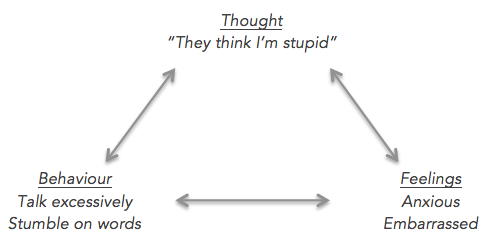
Understanding CBT for Anxiety Management
Notice your heart racing in certain situations? Maybe you blush frequently or sweat profusely.
Does your mind sometimes feel consumed with worry? So much so, that you cannot concentrate on other things? You may even lay awake at night with worry.
Your fears may have grown so big that you avoid going to certain places, participating in some activities or attending particular social events.
You may be experiencing some symptoms of anxiety. There are many different types of anxiety: social anxiety, general anxiety, panic attacks and agoraphobia, and obsessions and compulsions.
There are several well-researched therapies shown to effectively treat anxiety. One in particular, which has a pile of evidence to support its use, is Cognitive behavioural therapy, or “CBT” for short. CBT for anxiety works on the assumption that the way you feel (anxious!), the way you think, and the way you behave, are all inter-connected. A CBT psychologist who treats anxiety will work to reduce your anxious feelings by directly giving you strategies to calm your nerves, but they will also aim to reduce your anxiety by helping you change your thoughts and behaviours.
The example below – for someone who experiences anxiety in social situations – shows how our feelings, thoughts and behaviours are connected in any given situation. In this example, the person is speaking to their work colleague and trying to befriend them.

A CBT psychologist for anxiety will help:
- Identify your anxious thoughts. This includes understanding on a deeper level the type of beliefs that may lead to these thoughts. With the example above, the thought “they think I’m stupid” may come from an underlying belief that “others do not like me”.
- Your CBT psychologist will then help you reframe your thoughts and beliefs, to form thoughts and beliefs that are fair and realistic. There are many ways a CBT psychologist will achieve this – for starters, if you think “they think I’m stupid” in a conversation, you are attempting to read the other person’s mind!
- Teach you strategies to calm your anxiety. These range from mindfulness-based strategies to breathing and relaxation techniques.
- Work to change your behaviours, which will increase your confidence. It is very common with anxiety to avoid situations that make us feel uncomfortable. However, the more we avoid our fears, the bigger our fears become. A CBT psychologist that treats anxiety will plan small do-able steps towards overcoming your fears. This particular type of CBT therapy is called Exposure Therapy. We demonstrate via the principals of Exposure Therapy how you can take Small Steps Towards Improving How You Cope with Anxiety at Work.
- A CBT psychologist helps you to reduce your focus on anxiety. Do you notice the more you fear anxiety, the more it seems to stick around? CBT for anxiety includes a particular therapy, called Acceptance and Commitment Therapy (ACT), which focuses on reducing our reaction to the anxiety itself. For example, if you fear your anxiety, you naturally become hyper-focused on the feelings of anxiety, which in turn can cause further anxiety, or even panic.
What outcomes to expect from CBT treatment for anxiety:
- Improved insight into the cause and nature of your anxiety
- Improved ability to calm your anxiety
- To be less fearful of your anxiety
- Increased exposure and ability to face feared situations
- Overall, feeling more relaxed and less on edge
- Improved confidence and sense of self
How can Peaceful Mind Psychology help?
We are warm and empathic psychologists based in Melbourne, who are experienced and trained in treating anxiety with CBT therapies. If you would like some professional assistance contact us at Peaceful Mind Psychology on 1300 766 870.We are located in Armadale, Hawthorn, and Prahran.
For more tips about how to manage symptoms of anxiety read Anxiety, Help I’m Drowning!. To check if you have any unhelpful beliefs about anxiety see Five Misconceptions About Anxiety. Is it possible that anxiety is creeping up on you? Or perhaps you’re unknowingly behaving in ways that make anxiety worse! To better understand what adds to and maintains anxiety see Sneaky Anxiety: How it Creeps Up. Or to if you’d like to learn more about how CBT works for social anxiety see CBT for Social Anxiety Treatment.
